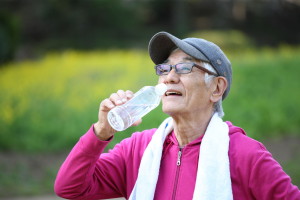The Vital Role of Hydration in Caregiving: Why You and Your Loved One Must Stay Properly Hydrated
 Caregiving is a labor of love, requiring patience, dedication, and a constant awareness of the physical and emotional needs of the person under your care. Whether you’re looking after an elderly parent, a chronically ill family member, or someone recovering from surgery, maintaining proper hydration is a crucial but often overlooked aspect of caregiving. Hydration impacts every system in the body, influencing energy levels, cognitive function, physical health, and emotional well-being. As a caregiver, ensuring both your own hydration and that of the person you care for can significantly improve quality of life and even prevent serious health complications.
Caregiving is a labor of love, requiring patience, dedication, and a constant awareness of the physical and emotional needs of the person under your care. Whether you’re looking after an elderly parent, a chronically ill family member, or someone recovering from surgery, maintaining proper hydration is a crucial but often overlooked aspect of caregiving. Hydration impacts every system in the body, influencing energy levels, cognitive function, physical health, and emotional well-being. As a caregiver, ensuring both your own hydration and that of the person you care for can significantly improve quality of life and even prevent serious health complications.
Why Hydration Matters for Caregivers
First, let’s talk about you — the caregiver. Caregiving is demanding, physically and emotionally. Long hours, stress, and the constant vigilance needed to manage medications, appointments, and personal care can leave you exhausted. Hydration is essential to keep your body functioning at its best during these demanding times.
1. Energy and Focus: Dehydration, even mild, can lead to fatigue, dizziness, and impaired concentration. For caregivers, staying alert is critical — whether it’s to safely assist with mobility, administer medications, or respond quickly in emergencies. Drinking enough water helps maintain energy levels and sharpness, enabling you to provide better care.
2. Stress Management: Hydration supports your nervous system, helping regulate stress hormones like cortisol. When dehydrated, your body experiences additional stress, making it harder to manage the emotional ups and downs of caregiving. Staying hydrated can improve your mood and resilience.
3. Physical Health: Caregiving often involves lifting, bending, and moving, all of which place physical strain on your body. Water keeps muscles lubricated and joints flexible, reducing the risk of injury or strain. It also supports healthy digestion, helping you avoid constipation or other digestive issues common during stressful periods.
4. Immune Support: Caregivers are frequently exposed to germs and illness. Proper hydration supports immune function, helping your body fight off infections and recover more quickly if you do get sick.
Hydration Challenges for Caregivers
Despite these benefits, caregivers often neglect their own hydration needs. You might skip drinks to avoid frequent bathroom breaks, especially when you’re always “on duty.” You may also prioritize the needs of your loved one over your own basic needs, including drinking water. It’s essential to break this pattern — your well-being directly affects the quality of care you can provide.
Hydration and the Person You Care For: Why It’s Even More Critical
For the person receiving care, hydration is often even more fragile. Older adults, people with certain illnesses, or those with cognitive impairments may not recognize thirst or be able to drink independently. This puts them at high risk for dehydration, which can cause a cascade of health problems:
1. Cognitive Decline: Dehydration can worsen confusion, memory loss, and irritability — symptoms often mistaken as progression of dementia or other neurological conditions. Ensuring adequate fluid intake can help maintain cognitive clarity and reduce agitation.
2. Urinary and Kidney Health: Proper hydration is crucial for kidney function and preventing urinary tract infections, which are common and serious issues in those with limited mobility or catheter use.
3. Skin Integrity: Dehydration can lead to dry, fragile skin that is prone to breakdown and pressure sores — a major concern in bedridden or less mobile individuals.
4. Digestive Health: Water aids digestion and prevents constipation, which is common among people on medications or with reduced physical activity.
5. Overall Energy and Vitality: Just like caregivers, those receiving care need hydration to maintain strength and stamina, helping them stay as active and engaged as possible.
How to Ensure Adequate Hydration for Both Caregiver and Care Recipient
1. Establish Routine Drinking Habits: Set specific times for drinking water throughout the day — for example, with every meal, snack, or medication time. Use reminders or alarms if necessary.
2. Make Fluids Accessible and Appealing: Keep water bottles or cups nearby. Some people prefer flavored water, herbal teas, or electrolyte-enriched drinks. For those with swallowing difficulties, thickened fluids may be required; consult healthcare professionals.
3. Monitor Intake and Output: Track how much the person you care for is drinking and their urine output. This can alert you to potential dehydration early on.
4. Recognize Signs of Dehydration: Dry mouth, sunken eyes, decreased urine output, confusion, dizziness, and lethargy are all warning signs. If you notice these, encourage fluid intake and seek medical advice if needed.
5. Caregiver Self-Care: Drink regularly throughout the day, not just when thirsty. Carry a water bottle with you, take hydration breaks, and don’t skip meals, as food also contributes to fluid intake.
6. Incorporate Hydrating Foods: Fruits and vegetables like watermelon, cucumber, oranges, and strawberries are high in water content and provide vitamins and minerals beneficial for both caregiver and care recipient.
When to Seek Medical Advice
Sometimes dehydration requires medical intervention, especially if the person you care for shows severe symptoms such as rapid heartbeat, confusion, fainting, or low blood pressure. IV fluids or other treatments may be necessary.
Conclusion
Hydration is a foundational element of health that profoundly affects both caregivers and those receiving care. By prioritizing adequate fluid intake, you support physical strength, mental clarity, and emotional well-being — vital components of effective caregiving and quality of life. Remember, caring for yourself is not a luxury; it’s an essential part of caregiving. Keep a water bottle at hand, establish hydration routines, and encourage the person you care for to do the same. This simple yet powerful habit will help both of you stay healthier, more alert, and more resilient in your caregiving journey.






